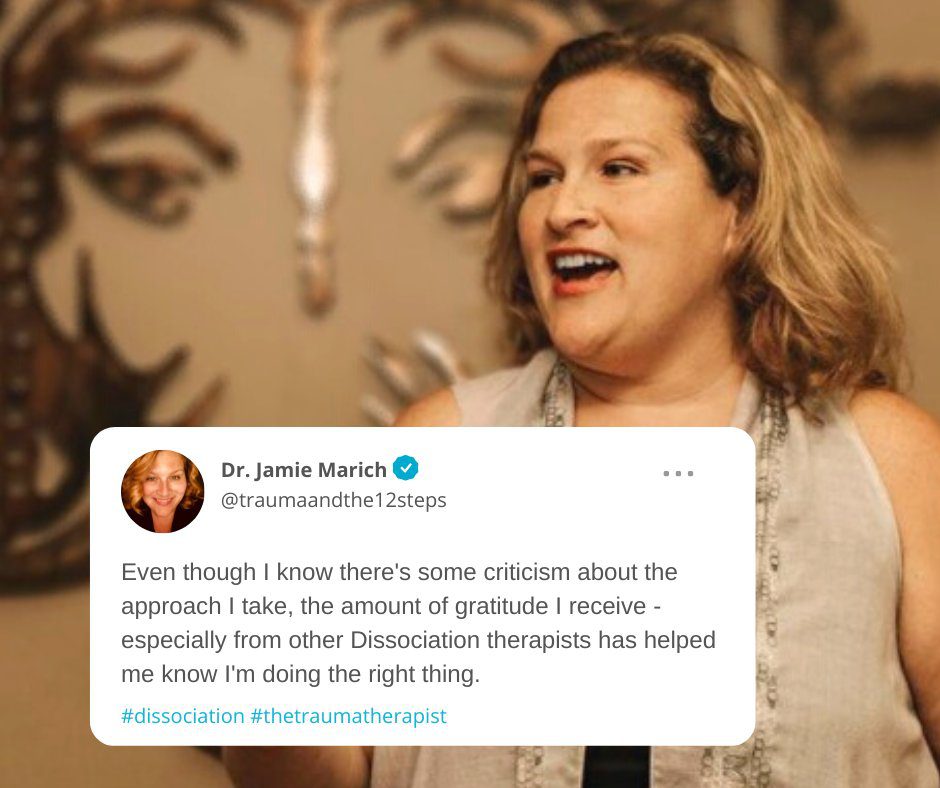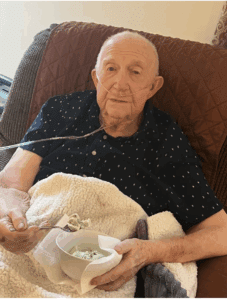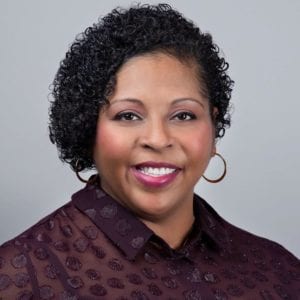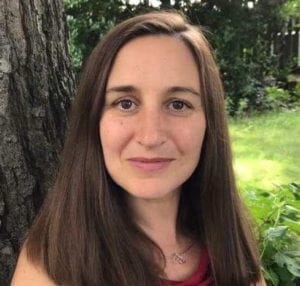“In her interview for this project [Dissociation Made Simple], I asked her [my therapist Elizabeth Davis] if she had any concerns about me coming out with my diagnosis, or if any concerns have surfaced for her since. She honestly answered no, but then turned the question around on me to ask if anything has surprised me about coming out that feels concerning. My honest answer is that I was not expecting to be inundated with so many emails and messages from people reaching out and asking for help and guidance. Such messages continue to this day, and I expect they’ll be even more numerous after this book is published.” -Dissociation Made Simple, p. 201
The prediction that we made in Chapter 7 of the book has not only come true since the release of Dissociation Made Simple on January 10, 2023, it has led us into a deep contemplation about how we can best serve our fellow plural therapists going forward. We’ve said it in several interviews now that it is still a shock to us that here we are in 2023 and large numbers of therapists are still ashamed, embarrassed, or afraid to come out in professional circles about their own struggles with mental health. And yes, any dissociative diagnosis or existence of a plural system within a therapist seems to still bear an even greater mark of shame in larger professional circles. While I’m/we’re happy that our very public coming out and progressively bolder assertion of our plurality is an inspiration to many other therapists, we are still fucking pissed off that we have to be that role model. These are the mental health professions, it shouldn’t have to be this way. And even plural therapists who are involved in other trauma and dissociation-informed organizations are still reporting to me significant trepidation about being out, often because their mentors are still discouraging them. There is great fear that the study of trauma and dissociation won’t be taken seriously enough if we get too human.
Pardon me while we gag… yet at this point, we can’t help but keep it real. There is no way that we will ever eliminate stigma about mental health struggles in society unless mental health therapists experience less stigma, or (let’s call it what it really is) discrimination amongst their peers and mentors. And we do not have a prayer of destigmatizing dissociation at the societal level until plural therapists can feel fully accepted and safe enough within our own field. Once more, we are not surprised to have received so many more of these reports from fellow plural therapists since the book release—after all, we remember how unwelcome we’ve felt being ourselves at plenty of mental health conferences, even within the trauma and dissociation communities. Yet we are experiencing a mixture of sadness, rage, and yes, deep love that is fueling us into deeper action. We are going to continue speaking up and if that makes the established leaders in the trauma and dissociation community uncomfortable, so be it. Perhaps this discomfort will lead to the change that we really need to make therapy and healing fully human.
Another excerpt from Dissociation Made Simple is worth highlighting as we discuss the issue at hand. This lived experience comes from Blaise Harris, a former firefighter turned clinical counselor practicing in North Carolina. Blaise accepted the invitation to contribute to the book as he has been very open about his depression from his days as a student. He spoke to how dissociation has shown up in his diagnosis over the years and how it’s been a tool for him in navigating living as a Black man in the South. And this reflection from his graduate training offers us so much wisdom:
Blaise reflects back on the mixed messages he received during his own graduate training: Build rapport, yet be a robot. He remembers getting feedback that he was too relaxed in sessions and people wouldn’t take him seriously. What stung even more is that the feedback came from a Black male professor. Yet Blaise has learned throughout his young career that people seem to like him and connect with him because he is real, and that’s a quality he also looks for in a therapist who might be working with him (p. 227).
Although not a perfect comparison, we relate to that “stinging” sensation of being shut down by other professionals we admire, especially in the field of trauma and dissociation, for being too candid. Too real. Not professional or academic enough. For many years we thought that we might have been alone in this experience and that feeling the way we did after interacting with so many professionals and learned scholars said something about us. That we hadn’t healed enough. That we had some kind of a chip on our collective shoulders.
With every year that we’ve been out, we meet more therapists who have DID, OSDD, or other struggles with dissociation, or at least they believe that they do and have been too afraid to say anything. And we realize that our responses had little if anything to do with our bitterness and immaturity and everything to do with being able to read energy very well. We maintain what we share in Dissociation Made Simple that at this point in our lives, we evaluate the credibility of professionals and mentors by how safe our Four part feels in their presence. And let me tell you, it’s very few of the important names in trauma and dissociation that have made us feel that way. To be clear, some of them have. We are still so grateful to Dr. Colin Ross for coming to one of our first major “coming out” presentations at Healing Together in 2020 and listening attentively and respectfully, not shaming us in any way afterwards. So we certainly don’t mean to vilify the entire trauma establishment as we’ve met plenty of supportive folks along the way. Yet we’ve also dealt with our share of sneers, microaggressions, and obvious discomfort whenever we get too personal. And in talking to many of my peers over these last few weeks, they’ve had it a lot worse. We recognize that leaning into the science and academics of this work is an important component of what allows dissociative disorders to have credibility, and this credibility is vital in a field where our existence can still be negated. Yet if teaching on dissociation in such an academic way is going to promote the stereotype of dissociative disorders as tricky if not impossible to treat, the way we teach on and discuss dissociative disorders clinically must change.
We truly believe that even though the thought leaders may say that they are afraid of us being fully out because of professional credibility and boundaries, we think there’s something bigger going on. The larger powers that be, even within the mental health professions, may be afraid of us coming out in droves and leading from the heart, from lived experience. It seems to me that so many of the specialists in trauma and dissociation have gotten that way because they have a great deal of experience dissociating their lived experience from their professional presentation in the name of credibility. Early on in our career, we were overjoyed to read that one leader in the field of dissociation studies acknowledged that the manifestations of DID are simply extreme symptoms of the internal world of parts and dissociative experiences that define us all. Yet our hearts sank a bit when we met her at a conference and a wall seemed to go up about engaging in anything personally. As we shared in a TikTok video during the week of the book’s release, we are grateful for our allies who at least believe in the dissociative mind in a larger field that can still be hostile toward the very existence of dissociation and our related diagnoses/ways of being. Yet now that more of us are out, we are going to be holding you to a higher level of accountability in how you talk about us, represent us, and treat us.
As you reach out to us, Dr. Jamie/Jamie+, please continue to let us know how we can best serve you. There have been two main requests that we’ve been fielding since the book launch: (a) to establish a more organized collective of plural therapists for professional networking, and (b) to have such a database of plural therapists available to plural clients. For the former, I/we encourage plural therapists to please check out An Infinite Mind as a first step as there is already a great deal of infrastructure in place for peer support, especially at the Healing Together Conference where there are regular meetings of plural therapists (whether you are “out” or not). We recognize that several informal peer groups have also formed from meeting at Healing Together and through other collectives, so if you find one that works for you, stick with it. We are working on some ideas here on our end, which includes possibly setting up some formal retreats for plural therapists. You may find our existing online day retreat style courses Navigating Self-Disclosure: A Course for Human Services Professionals (coming up next on February 10, 2023) to be just what you are looking for right now, and we are certainly open to continue running this again if more folks would like to take it.
Some of the most touching messages that we’ve received on TikTok and in the public social media space are from plural folks who are sharing things like, “Wow, I/we wish we could have a plural therapist!” It is so sadly evident that many plural folks are still having a problem being truly seen by their therapists, even those therapists who might specialize in trauma and dissociation. And the only hope remaining for many is to have a fellow plural work with them. Once again, our minds are stirring on how we can best bring together this resource for you all. Please feel free to share more ideas in the comments about what the greatest needs are in our community.
Lastly, as excited as we are about creating what may need to be created for us, we are also asking for your patience and understanding during this time. Like we write about in Dissociation Made Simple, taking good care of ourselves is our highest priority and we are needing to commit to that in a greater way now that there is even more attention on our work. Thus, we may not be able to answer every message in a timely manner and sometimes they get an indirect reply from one of our staff, yet they do get read and seen. Sometimes, actually many times, we need to say no or set a boundary about what we can do when met with requests. Your patience continues to be appreciated as we continue to learn even more about ourselves on this coming out journey and learn about the type of leader that we are becoming. Thank you for letting us be of service.















3 Responses
Thank you for being courageously real, for opening up this conversation to the field, and for educating professionals on how to think about and work with plurality.
I support and admire you. Thank you for your honesty and courage.
Thank you for your bold authenticity, for initiating this essential dialogue within the community, and for guiding professionals in thoughtfully engaging with and addressing the complexities of plurality. Your willingness to share and lead by example has paved the way for deeper understanding and more effective practices. Your contributions are invaluable in fostering a more informed and compassionate approach in this field.